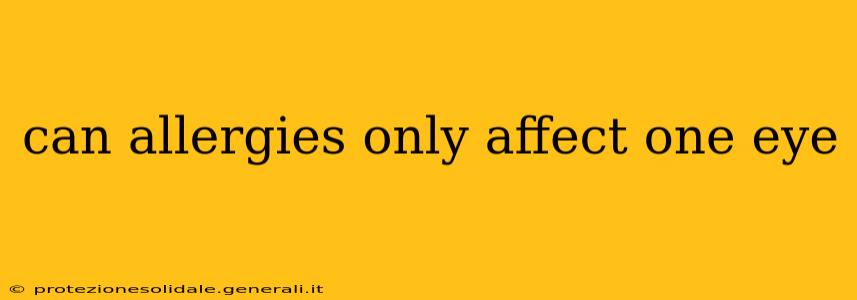Yes, it's possible for allergies to affect only one eye. While allergic conjunctivitis (allergic eye inflammation) commonly affects both eyes, unilateral allergic conjunctivitis, affecting just one eye, isn't uncommon. This can be confusing, leading many to wonder why only one eye is experiencing symptoms. Let's delve into the reasons behind this phenomenon.
Why Would Only One Eye Be Affected by Allergies?
Several factors can contribute to allergies impacting only one eye:
-
Asymmetrical Exposure: This is perhaps the most common reason. Imagine you're cutting grass, and the wind blows pollen directly into one eye more than the other. Similarly, if you rub your eye after touching an allergen, only that eye might experience the reaction. Uneven exposure to allergens leads to an uneven response.
-
Underlying Eye Condition: Pre-existing conditions in one eye, such as a minor infection or injury, can make that eye more susceptible to allergic reactions. The compromised eye might be more sensitive and prone to inflammation.
-
Blocked Tear Duct: A partially blocked tear duct in one eye can cause irritation and make it more vulnerable to allergic reactions. The buildup of irritants can trigger or worsen an allergic response.
-
Contact Lens Use: If you only wear contacts in one eye, that eye might be more exposed to allergens trapped within the lens or its solution. This increased contact can lead to a localized allergic reaction.
-
Individual Variation: Like many other allergic reactions, the body's response can be unpredictable. There's no single, universally accepted explanation for why allergies sometimes affect only one eye, and individual differences in immune response play a significant role.
What are the Symptoms of Allergic Conjunctivitis in One Eye?
Symptoms of unilateral allergic conjunctivitis are similar to those of bilateral (both eyes affected) allergic conjunctivitis, but confined to one eye. These can include:
- Itching: Intense itching is a hallmark symptom.
- Redness: The eye's conjunctiva (the clear membrane covering the white part of the eye) becomes inflamed and red.
- Watering: Excessive tearing is common.
- Swelling: Puffiness around the eye may occur.
- Discharge: A clear or stringy discharge can be present.
- Sensitivity to Light (Photophobia): The affected eye might be more sensitive to light.
How is Unilateral Allergic Conjunctivitis Diagnosed?
A doctor will typically perform a thorough eye examination to assess the symptoms and rule out other potential causes. They'll consider your medical history, ask about your allergies, and examine the affected eye for signs of inflammation, infection, or other underlying conditions.
What Treatments are Available for One-Sided Allergic Conjunctivitis?
Treatment for unilateral allergic conjunctivitis is similar to that for bilateral allergic conjunctivitis. The goal is to manage symptoms and reduce inflammation. Common treatments include:
- Antihistamine eye drops: These help reduce itching and inflammation.
- Mast cell stabilizers: These prevent the release of histamine, a key player in allergic reactions.
- Cold compresses: Applying a cold compress to the affected eye can help reduce swelling and itching.
- Artificial tears: These can help lubricate the eye and wash away irritants.
In cases of severe or persistent symptoms, a doctor might prescribe stronger medications such as corticosteroids. Always consult an ophthalmologist or allergist for diagnosis and treatment. Self-treating can be detrimental.
Can Allergies Affect Only One Eye and Then Spread?
While initially affecting only one eye, allergies can spread to the other eye in some cases. This is particularly true if the underlying cause isn't addressed, or if exposure to the allergen continues. Increased exposure or a more potent allergen might then lead to a bilateral reaction.
Is It Always Allergies if Only One Eye is Affected?
No. It's crucial to remember that eye redness, itching, and other symptoms aren't always caused by allergies. Other conditions like infections (conjunctivitis), dry eye, or even injuries can cause similar symptoms. Therefore, seeing an eye doctor for a proper diagnosis is essential. They can differentiate between allergic conjunctivitis and other eye conditions through a thorough examination.
By understanding the various factors contributing to unilateral allergic conjunctivitis, you can better manage your symptoms and seek appropriate medical attention when needed. Remember, while self-care measures can help alleviate symptoms, a professional diagnosis is crucial for effective treatment.
